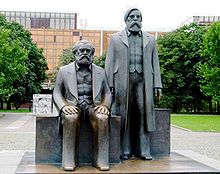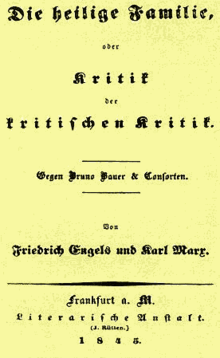- The Holy Family (book)
-
The Holy Family was a book written by Karl Marx & Friedrich Engels in November 1844. The book is a critique on the Young Hegelians and their trend of thought which was very popular in academic circles at the time. The title was a suggestion by the publisher and is meant as a sarcastic reference to the Bauer Brothers and their supporters. The book created a controversy with much of the press and caused Bruno Bauer to attempt to refute the book in an article which was published in Wigand's Vierteljahrsschrift in 1845. Bauer claimed that Marx and Engels misunderstood what he was trying to say. Marx later replied to his response with his own article that was published in the journal Gesellschaftsspiegel in January 1846. Marx also discussed the argument in chapter 2 of The German Ideology.
History
During Engels' short stay in Paris (1844), Marx suggested that two of them should write a critique of the rage of their day, the Young Hegelians. In the doing was born the first joint writing project between the two men; and thus the beginning of their friendship.
After conversing, they began drawing up plans for a book about the Young Hegelian trend of thought very popular in academic circles. Agreeing to co-author the Foreword, they divided up the other sections. Engels finished his assigned chapters before leaving Paris. Marx had the larger share of work, and he completed it by the end of November 1844. (Marx would draw from his Economic and Philosophical Manuscripts, on which he'd been working the spring and summer of 1844.)
The foremost title line — "The Holy Family" — was added at the suggestion of the book publisher Lowenthal. Its a sarcastic reference to the Bauer brothers (Bruno and Edgar) and their supporters amongst the Hegelians who had attempted a critical renovation of Christianity, hence the subtitle a "Critique of Critical Critique." Later Marx will continue this sarcasm by referring to them as Saint Bruno, Saint Max (Stirner), etc.
The book made something of a splash in the newspapers. One paper noted, that it expressed socialist views since it criticised the "inadequacy of any half-measures directed at eliminating the social ailments of our time." The conservative press immediately recognized the radical elements inherent in its many arguments. One paper wrote that, in The Holy Family, "every line preaches revolt... against the state, the church, the family, legality, religion and property." It also noted that "prominence is given to the most radical and the most open communism, and this is all the more dangerous as Mr. Marx cannot be denied either extremely broad knowledge or the ability to make use of the polemical arsenal of Hegel's logic, what is customarily called 'iron logic.'"
External links
The works of Karl Marx and Friedrich Engels Marx Scorpion and Felix (1837), Critique of Hegel's Philosophy of Right (1843), On the Jewish Question (1843), Notes on James Mill (1844), Economic and Philosophical Manuscripts of 1844 (1844), Theses on Feuerbach (1845), The Poverty of Philosophy (1847), Wage-Labor and Capital (1847), The Class Struggles in France, 1848–1850 (1850), The Eighteenth Brumaire of Louis Napoleon (1852), Grundrisse (1857), Preface to A Contribution to the Critique of Political Economy (1859), Theories of Surplus Value, 3 volumes (1862), Value, Price and Profit (1865), Capital, Volume I (Das Kapital) (1867), The Civil War in France (1871), Critique of the Gotha Program (1875), Notes on Wagner (1880), Mathematical manuscripts of Karl Marx (1968)Marx and Engels The German Ideology (1845), The Holy Family (1845), Manifesto of the Communist Party (1848), Writings on the U.S. Civil War (1861), Capital, Volume II [posthumous to Marx, published by Engels] (1885), Capital, Volume III [posthumous to Marx, published by Engels] (1894)Engels The Condition of the Working Class in England in 1844 (1844), The Peasant War in Germany (1850), Revolution and Counter-Revolution in Germany (1852), Anti-Dühring (1878), Socialism: Utopian and Scientific (1880), Dialectics of Nature (1883), The Origin of the Family, Private Property, and the State (1884), Ludwig Feuerbach and the End of Classical German Philosophy (1886)Categories:- Books by Karl Marx and Friedrich Engels
Wikimedia Foundation. 2010.


